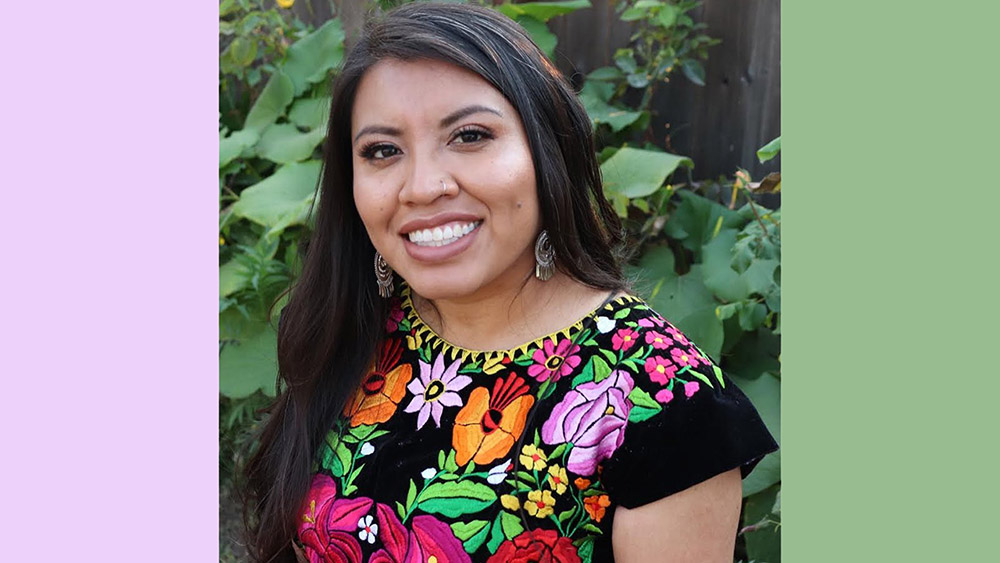
California Forward is committed to advancing policy intersections that create a more inclusive and sustainable California where all people can prosper. The Voices of Shared Prosperity series amplifies the stories of Californians who are committing their time and talent to solutions that embrace equity, environmental sustainability, and economic opportunity.
When Dr. Sarait Martinez became executive director of the Centro Binacional para el Desarrollo Indígena Oaxaqueño (CBDIO, The Binational Center for the Development of Oaxacan Indigenous Communities), she brought a wealth of knowledge and lived experience with her.
CBDIO is a community-based organization that started in 1993. It was created by Indigenous farmworkers who saw the need to help their fellow Indigenous farmworkers navigate social services across the state because there were language barriers that made it hard to access services in the community. Since then, it has transformed into an organization that builds power in the Indigenous farmworker community, as well as provide support to meet the community’s immediate needs. They have offices in in Fresno, Greenfield, Salinas, and Madera.
In Greenfield, Dr. Martinez says, “The work started 15 years ago providing support to the new generation of Indigenous children being born and parents not being able to access services and information to better support the kids because of structural cultural and linguistic barriers.”
The Xi’na Navali (The Children First), is an early childhood program that helps connect Mixteco and Triqui families to resources by providing child developmental screenings and resources for parents to support their children. As part of the First 5 Monterey collaborative, CBDIO provides services to children prenatal through five years old and their families.
Family support begins early, according to Dr. Martinez, “We provide holistic support to our parents through connection to services and developmental screening for children to make sure the parents know of the resources available in the community and have the support they need.”
CBDIO works to connect parents to resources and support the families, who have challenges providing child care.
“Kids here, especially farmworker kids, they have a different childhood than in our hometown,” said Dr. Martinez. “The farmworker parents that we work with — they go to work at five in the morning, they take the children to child care. Often, it’s not formal child care, but family members. They grow up being taken care of by someone else. The parents pick them up after work, and farm work is very tiring work. They have to take care of the kids and prepare for the next day.”
| The percent of 3-4-year olds enrolled in preschool in Fresno County was 41% in 2019, compared to the statewide rate of 50%. Learn more with CA FWD’s California Dream Index. |
|---|
The daughter of Zapoteco Indigenous farmworkers, Dr. Martinez emigrated to the Salinas Valley from Oaxaca, Mexico when she was 16. Her family has a long history of working in California. Her grandparents were part of the Bracero program, government programs that brought workers to the U.S. to work in agriculture.
She received her Bachelor of Arts in Political Science and Chicano and Latino Studies with a minor in Economics as well as a master’s degree in Public Administration from California State University at Fresno. She also earned a doctorate in Educational Leadership from San Francisco State University, where she focused on the education, empowerment and well-being of Indigenous immigrant youth.
She has since worked with several organizations that service Indigenous communities both in Central Valley and the Central Coast. “Coming to the U.S. really allowed me to reclaim my Indigenous background,” she said. “It helped me learn about my culture and others Indigenous groups in the State of Oaxaca and in Mexico.”
According to Dr. Martinez, education about Indigenous communities among institutions and programs is important to help families access the services they need. “I think there’s a lot of awareness that still needs to happen about kids and kids’ cultures and languages.”
She said that many of the children enter preschool or childcare speaking only their Indigenous language. “For institutions to understand or learn about the community that exists in the counties and the regions they serve is important toward making sure they tailor and provide the services and the programs acknowledging the linguistic needs of the communities.”
CBDIO’s work is impactful to central California’s Indigenous communities because much of the organization’s staff knows the experiences of the farmworkers they are helping. “Most of our staff comes from the community that we serve, so our staff is bilingual or trilingual in their Indigenous language and Spanish and English,” said Dr. Martinez. “Every Indigenous group is different. They have different traditions and cultures, but they are traditions that our staff is able to share with the parents that we support.”

